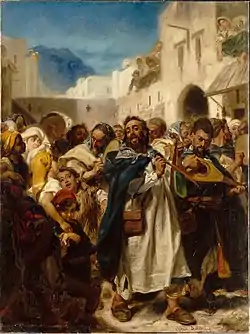أحداث شغب وجدة وجرادة
أحداث شغب وجدة وجرادة أو أحداث شغب ضد اليهود 1948[1] هي أحداث اضطرابات وقعت يومي 7 و 8 حزيران عام 1948، في مدينتي وجدة وجرادة الواقعتين في الشمال الشرقي للمملكة المغربية في فترة الحماية الفرنسية على المغرب.
أسفرت تلك الأحداث عن مقتل 43 يهودي وفرنسي واحد هذا مع إصابة نحو 150 آخرون بجروح مُتفاوتة الخُطورة على أيدي المسلمين المحليين.[2]
وقد أكَّد المسؤولين الفرنسيين بأن أعمال الشغب هذه لم تكن مُتوقعة على الإطلاق خاصة في وجدة وجرادة وأن السبب هو الهجرة نفسها وليس عداء المُسلمين لليهود.[3]
اندلاع أحداث الشغب
ذكر رينيه برونيل المفوض الفرنسي في منطقة وجدة بأن أعمال الشغب بدأت عندما حاول حلاق يهودي العبور إلى الجزائر وهو يحمل معه متفجرات، [4] وقد كتب برونيل أن الجو كان "محموما" نتيجة للهجرة السرية عبر الحدود لعدد كبير من الشباب الصهاينة من جميع مناطق المغرب محاولين بكل شكل من الأشكال الوصول إلى فلسطين عبر الجزائر."[4] وقد ذكرت وزارة الشؤون الخارجية الفرنسية أن الهجرة اليهودية من وجدة إلى فلسطين شكلت مصدر إزعاج كبيرا للسكان المسلمين المحليين، مشيرا في الوقت نفسه إلى أن السمة التي تطغى في هذه المنطقة القريبة من الحدود الجزائرية هي النظر واعتبار جميع اليهود الذين يغادرون وجدة كمقاتلين من أجل إسرائيل.[4] وقد أشار ألفونس جوان المقيم العام في المغرب إلى أن الهجرة السرية لليهود نحو فلسطين أشعلت الغضب وأثارت فعلا العديد من أفراد الشعب ومن المحرضين.[4]
وقد اقترح أيضا أن أعمال الشغب هذه قد اندلعت قبل خطاب السلطان محمد الخامس في فترة الحرب العربية-الإسرائيلية سنة 1948 والتي هاجم وعادى فيها الصهيونية بشكل صريح، والرغم من ذلك فإن مجموعة من المحللين أكدوا على أن خطاب سلطان تم توجيهه قصد التركيز على ضمان حماية لليهود المغاربة.[5]
الشغب
بدأت أعمال الشغب في مدينة وجدة، التي كانت في ذلك الوقت محور العبور الرئيسي للصهاينة قصد الهجرة خارج المغرب، وبالنظر إلى قربها من الحدود الجزائرية (الجزائر كانت في ذلك الوقت جزءا من فرنسا متروبوليتان)، فقد تم قتل 5 من اليهود مع إصابة 30 آخرين بجروح وذلك قبل 3 ساعات من وصول الجيش، مما أدى إلى إثارة الغوغاء والشغب في المناطق المجاورة لوجدة خاصة مدينة جرادة التي شهدت عنفا أكبر تسبب في قتل 39 شخص.[6]
المراجع
- Dalit Atrakchi (2001). "The Moroccan Nationalist Movement and Its Attitude toward Jews and Zionism". In Michael M. Laskier and Yaacov Lev. The Divergence of Judaism and Islam. University Press of Florida. p. 163.: "...the riots that broke out on 7 June 1948 in the cities of Oujda and Jerada, close to the border between Morocco and Algeria, which served as a transfer station for Moroccan Jews on their way to Israel... It is believed that the riots were brought on by the speech given a short while earlier by Sultan Muḥammad Ben-Yussuf, which inveighed against the Zionists and cried for solidarity with the Arabs fighting in Israel. Claims have been made that the French authorities not only knew about these impending events but also goaded and collaborated with the instigators as a provocation against the heads of the Moroccan Independence Party, who could later be blamed for committing murder."
- Andrew G. Bostom (2008). The legacy of Islamic antisemitism: from sacred texts to solemn history. Prometheus Books. صفحة 160. مؤرشف من الأصل في 02 أغسطس 2019. اطلع عليه بتاريخ 06 مارس 2011. الوسيط
|CitationClass=تم تجاهله (مساعدة) - Mandel 2014، صفحة 38: "Similarly, [French] officials argued against awarding international refugee status to Moroccan Jews, insisting that the 1948 riots in Oujda and Djérada had been "absolutely localized." It was, they warned, migration itself - and not widespread anti-Jewish animosity - that had sparked Muslim anger."
- Mandel 2014.
- Andr%C3%A9 Chouraqui [//en] (2002), "Between East and West: A History of the Jews of North Africa". (ردمك 1-59045-118-X), "On May 23, 1948, scarcely a week after the proclamation of the State of Israel, the Sultan of Morocco made an appeal to his subjects in which he reminded them of the protection that Morocco had always accorded to the Jews. He asked the Jews to refrain from all Zion ist manifestations, and the Moslem population to prevent any disturbance of the peace."
- Andr%C3%A9 Chouraqui [//en] (2002), "Between East and West: A History of the Jews of North Africa". (ردمك 1-59045-118-X), "Finally, on June 7, the crowd, sparked off by a minor incident, poured into the Jewish quarter. In the three hours that passed before the army could control the mob, five people (including one Frenchman) had been killed, thirty had been severely injured, shops and homes had been sacked. The same night an even more serious riot occurred in the neighboring mining town of Djérada where the Jewish population, consisting of about a hundred souls, had been surrounded by an uncontrollable mob and attacked with outrageous savagery. Neither children nor old men were spared; thirty-nine Jews lost their lives, thirty were severely injured and others less severely so."
وصلات خارجية
- Mandel, Maud (2014), Muslims and Jews in France: History of a Conflict, Princeton University Press, ISBN 9781400848584 الوسيط
|CitationClass=تم تجاهله (مساعدة); الوسيط|separator=تم تجاهله (مساعدة)CS1 maint: ref=harv (link) - ضحايا أعمال الشغب في وجدة وجرادة بتاريخ 7 و8 يونيو 1948
- بوابة اليهودية
- بوابة وجدة
- بوابة إسرائيل
- بوابة الأديان
- بوابة التاريخ
- بوابة الحرب
- بوابة السياسة
- بوابة المغرب
- بوابة حقوق الإنسان

